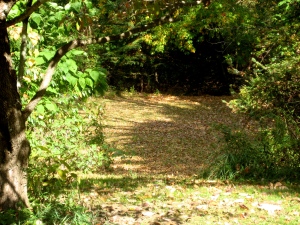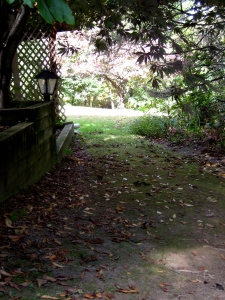Still dealing with computer issues, but here is a blog from Chuck, sans pictures again, but offered with our heartfelt wishes for good journeying through all the changes.
The human animal is acutely aware of great change on the horizon. Such impending change produces a collective fear that emanates from the deepest stratum of our instinctual selves, rising to the surface in our individual experiences as anxiety. We seek to dispel this anxiety by seeking refuge in our ego self, which responds by associating the anxiety with current events as it defensively reasons us to provisional security. This anxiety/fear, however, goes deeper than that, into the very nature of our human animal selves.
The question arises: How do we achieve real security? The truth is that although it is evident that we are in for great planetary change, life is and has always been about great change. All life ends; what greater change could there possibly be?
Real security is not to be found in a respite from change. A respite from change may temporarily be found in the ego’s bag of magical defenses, but such respite is an illusion. In reality change is constant and unrelenting. We might, nonetheless, discover a sense of real security on a warm day at the beach.
The ocean tide is the ultimate expression of unrelenting change. The heartbeat of the earth never ceases in the circulatory system of the ocean’s waves. If we lie calmly at the seashore, we might attune ourselves to the sounds of the true pulse of change. No wave is ever the same. Some waves are calm and smooth, others are crushingly powerful.
If we venture beyond our sandy bed into the ocean waves we experience more directly the energy of change. As the waves approach we might decide to learn to dance with them, timing our moves to leap at just the right moment, barely impacted by the passing waves. If our timing is slightly askew we might find ourselves mercilessly dragged down and under, into sand and swirls, frantically awaiting release that we might breathe again. Most times we are released back into life, returned to the control of our own bodies. Sometimes the ocean claims life, the catalyst to moving into new form.
Perhaps we might decide to align ourselves with the flow of the waves, with the energy of change, as we ride the cresting waves ashore. Sometimes we are fooled or miscalculate and again find ourselves pulled asunder, forced to face the crushing uncertainty of change head on.
Real security, however, is only to be found in facing the inevitability of change by allowing the ego self to learn about its energy, discovering how to ride it successfully by facing the truth of our own lives.
If we can allow ourselves to engage with consciousness in our dreams and bring them to waking life, we enter more deeply into the ocean of our deeper selves.
If we can allow ourselves to fully experience our feelings in the present, and in our deepest memories in recapitulation, we release the energy of stored inner tidal waves and learn to stay afloat through the inevitable storms of our lives.
And yes, if we can allow ourselves to fully reexperience our deepest encounters with terrors that once tore us asunder, we gain the knowledge of holding together through the greatest cataclysms of change.
Real security is to be found in the ability to flow with the changes that life presents us with. To fully become our wholeness we must allow for encounters with, and knowledge of, the parts of ourselves that rock the limited identity our ego has constructed to keep us safe. But let’s not sell the ego short; it is fully capable of the growth to fluidity that is necessary to accept life on its own terms without machinations to make it palatable.
Bring your ego to the beach of your dreams tonight. It’s fine to rest comfortably on the shore and attune to the rhythm of change. The time will come when you are ready, or not, for the deeper plunge into the ocean of pulsing life and constant unrelenting change. Real security is found in flowing with the changes, wherever they take you.
Resting comfortably on the beach, until the next wave comes along,
Chuck









